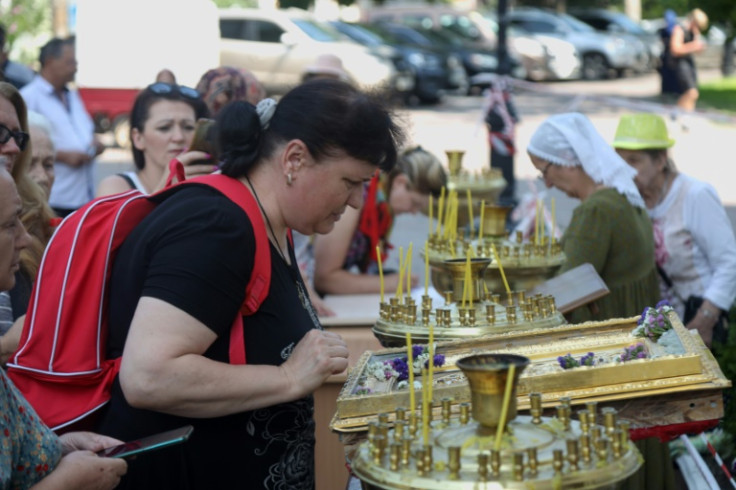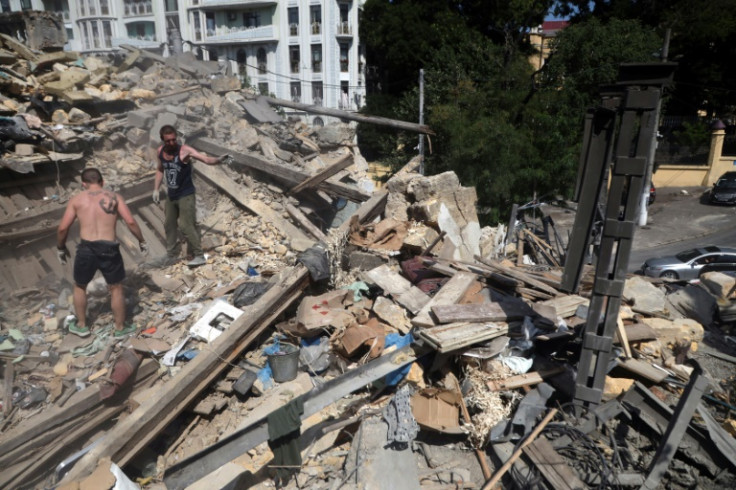'Such Pain': Odesa Cathedral, Demolished By Soviets, Hit By Russia

A group of Ukrainian officials anxiously eyed deep cracks in the back wall of the Transfiguration Cathedral in Odesa, days after Russian missiles pummelled the UNESCO-protected port city.
"The threat is that part of the building where that crazy Russian missile came down -- it's moving," Odesa mayor Gennadiy Trukhanov told AFP outside the Orthodox cathedral, following the Sunday strike.
The mayor later told the 84-year-old Orthodox cleric responsible for the diocese, Metropolitan Agafangel, that the wall needed to be taken down.
"It is dragging the whole building down," he said.
Odesa, a Black Sea port with historic central streets on UNESCO's World Heritage List, had suffered comparatively little war damage until recent days.
But after Russia scrapped a grain export deal with Ukraine, it pounded port areas and damaged some of Odesa's oldest and most beautiful buildings.
"We haven't had such attacks on Odesa. This is the first time," said the mayor.
The Transfiguration Cathedral is not old, and was completed in the early 2000s.
But parishioners and clerics said it was precious because it was built from public donations, recreating a cathedral demolished by Soviet authorities.
The city chief asked the Metropolitan for permission for partial demolition and asked him to warn visitors against walking near the cathedral.
"They shouldn't put themselves in danger by being here."
"It's awful, awful," the Metropolitan replied softly.
"A tragedy. What a holy place. The Russian defence ministry said there were foreign depots. What depots are there here?"
Earlier the head of the Odesa diocese toured the cathedral with clerics in plastic construction helmets.
He also joined an outdoor prayer service. Some wept as they listened to clerics in golden and black robes chanting and singing.
Large gold icons and cherubs' faces were propped up against the cathedral's walls and workers were blocking up windows with chipboard.
Inside, volunteers had swept the floor clean and stacked up ripped and shrapnel-scored icons.
Ornate wall paintings, only completed this Easter, had been ripped away, exposing the concrete and metal structure.
"These walls aren't just walls. They were put up with our hands, with our love. Now it's such a blow, such pain, such grief," said Galyna, 58, who was selling candles to raise money for restoration.
"This church is the pride of Odesa," said 85-year-old worshipper, also named Galyna, examining an icon of the Holy Virgin, rescued almost intact.
The Ukrainian Orthodox Church was previously under the Moscow Patriarchate.
While it has formally broken ties, many in Ukraine see it as still loyal to Russia.
But the spokesman for the Odesa diocese, Archpriest Maximian Pogorelovskiy, 31, said he and other clerics felt "hatred, non-acceptance and lack of understanding" over what Russia did.
"They aimed at the cathedral, probably to scare us, to confuse us," he said.
The Kremlin denied targeting the cathedral, blaming Ukrainian air defences.
The archpriest linked the destruction of the original cathedral by the Soviets to the Russian missile attack.
"This cathedral was rebuilt, everyone was glad, and now the inheritors of that Bolshevism -- Russian rockets -- have destroyed this cathedral."
The strikes left a trail of destruction, blowing out windows in the historic House of Scientists, a professional centre and events venue, and hitting low-rise stone apartment buildings near the port.
Asya Kashpyruk, a 22-year-old student and dancer, boxed up dresses and books in her bedroom in her family's apartment on the top floor of a 19th-century stone building, after it was left with walls askew and gaping holes in the ceiling.
"This is our flat -- what's left of it," she said bitterly.
In the courtyard outside, rose bushes and grape vines were still coated with dust from the pulverised building.
"It was very friendly, we had good relationships, we had a lot of stray cats which we were feeding," Kashpyruk said of the space.
Now put up in a hotel, the family said they feared even a heavy downpour could destroy their flat, since the roof is largely ripped off.
Asya's mother, Katarina, said officials told her the building was under UNESCO protection, and therefore they "can't do anything".
"Will they wait for it to fall down?" she asked.




© Copyright AFP 2024. All rights reserved.





















